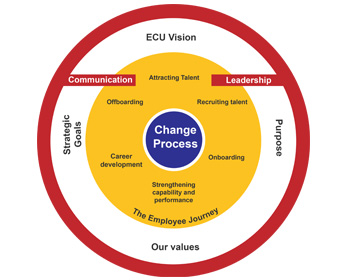| Activities | Resources | Professional Development | Support |
|---|---|---|---|
Identify and nominate change sponsor/champion and final decision maker at the appropriate level Communicate
Establish project team Facilitate and develop project plan - include consideration of parallel processes which may be affected Consultation with key stakeholders Identify new capability requirements of people, structures, systems and processes | Consultation and Cooperation best practice guide Organisation Readiness Tool (Contact ODT) | Lynda change playlists (See Downloads) |
Facilitation of Change
To fulfil our vision “to be recognised for our world ready graduates and leading edge research”, we need to develop an organisation which is change ready. This means that we must be proactive in attracting, developing and managing staff who are able to adapt to change rather than only reacting to the needs of the work force when we progress through change. See ECU Change Framework.
ECU Change Framework
The Change Framework is a tool which can assist managers to develop a change ready workforce. The inner circle (Change Process) of ECU’s Change Framework allows Leaders, Managers, Supervisors and Staff to engage with change, for continuous improvement, in four easy to follow phases namely Pre Engagement, Engagement, Enablement and Embedding. Each phase provides an overview of Activities, Resources, Professional Development and Support that could be used in any change initiative.
As change is seen as a constant, ECU views the way we manage change as a holistic process. To facilitate change effectively, we need to follow an inclusive approach that keeps people engaged and energised.
Together with the alignment of organisational structures, we need to ensure that we have appropriate systems and processes in place in order to build capability of our people. The combination of these essential components are required to manage and sustain the desired change.
It’s important to stay focussed on the desired outcome; most of all, we need to “be the change we want to see” - Mahatma Ghandi: The Great Soul of India.
Pre-engagement phase
This stage occurs before the commencement of the change. Leaders will have assessed the need for change and created a vision for the future. They would have consulted with their Business Partner in regards to possible EBA processes. They have approval at the right level and are preparing and planning for the change
Engagement phase
At this stage, the organisation will be aware that change will take place and work will be undertaken to get ready for implementation of the change.
| Activities | Resources | Professional Development | Support |
|---|---|---|---|
Business Case/Project plan signed off with Exec Sponsor/Decision-maker approval. Reinforce the vision Consult with stakeholders/staff Plan new ways of working to create new policies, procedures and guidelines | Support resources for individuals (contact WSC) | LinkedIn Learning (See Downloads) | People and Culture Support Contacts Manager and or Supervisors Colleagues and Peers Coaches and/or Mentors Employee Assistance Program (EAP) Outplacement services |
Enablement phase
At this stage, the change is implemented and staff are beginning to engage in the new ways of working. They are building new skills and beginning to understand new processes and systems.
| Activities | Resources | Professional Development | Support |
|---|---|---|---|
Reinforce the vision Develop plans ready for implementation of new ways of working Where needed, review or develop process flows, policies, procedures and guidelines Develop team Charter – setting objectives, expectations, role clarity Acquire new resources Provide capability development as required Meet regularly as a team to clarify, direct and support. | .Stages, states and strategies Role Based Capability Development (RBDF). Framework | LinkedIn Learning (see Downloads) Role Based Capability Development (RBDF) Offerings Management for Performance System (MPS): Overview, Planning and Setting SMART Objectives Team performance and development (contact WSC) Inter-team process development (contact WSC) Alignment of strategic and operational planning workshops (contact WSC) | Manager and/or Supervisors Employee Assistance Program (EAP) Outplacement services |
Embedding phase
At this stage, the change has been implemented and staff are becoming proficient in the new ways of working.
| Activities | Resources | Professional Development | Support |
|---|---|---|---|
Reinforce the vision Develop safe feedback mechanisms Communicate and implement new policies, procedures and guidelines Continuous improvement reviews
Action quick wins and share successes Utilise reward and recognition systems | Role Based Capability Development (RBDF). Framework and Web based Tool Management for Performance System (MPS) Organisation Success Post Implementation Tool (contact WSC) Individual Satisfaction Evaluation Tool (contact WSC) | LinkedIn Learning (See Downloads) Role Based Capability Development (RBDF). Offerings Management for Performance System (MPS) Review: Constructive Feedback Team Building (WSC) | Manager and/or Supervisors People and Culture Support Contacts Employee Assistance Program (EAP) |
To lead change well, managers rely on highly developed leadership skills. Further resources and assistance can be found on the Management and Leadership Resources page.
